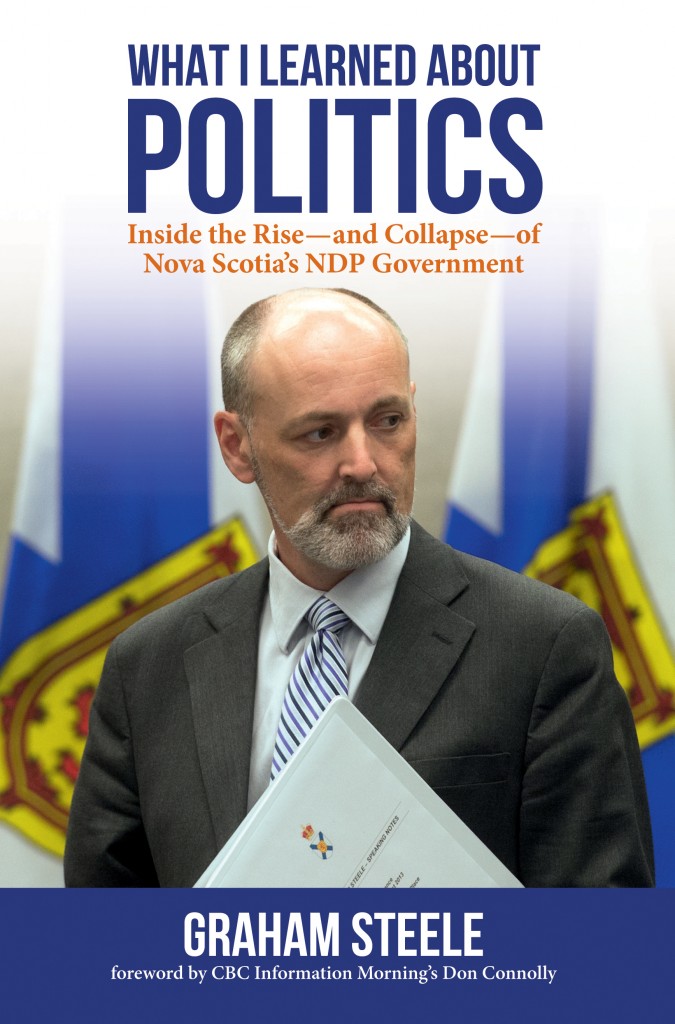Graham Steele’s “What I Learned About Politics” – A Review
What I Learned About Politics: Inside the Rise-and Collapse-of Nova Scotia’s NDP Government by former Nova Scotia Finance Minister Graham Steele is blunt, briskly written and relentlessly unsettling. Steele’s autobiographical account of his political career dices and slices many of the myths and illusions of our province’s political realities (Steele also served as Minister of Acadian Affairs, Minister of Economic and Rural Development and Tourism, and Minister of African Nova Scotian Affairs). It’s a remarkably post-ideological book, trashing the old “left vs. right” stances that have guided much of what passes for Bluenose political discourse.
Upon coming to power after the 2009 election, Steele reduces the recipe for fiscal management of the public purse to three choices, whilst admitting that the third is no option at all. He says that to manage the finances, either you increase taxes or cut services. Believing that you can ‘grow’ your way out of a 15 billion dollar debt and current account deficit is simply akin to believing in the Easter Bunny. It’s a fiscal and political conundrum faced by Finance Ministers, whether they be Liberal, NDP or Progressive Conservative. In Nova Scotia all parties have struggled to come to grips with it, none with true success.
Steele’s tome is full of other fascinating insights. His detailing of his constituency work is particularly fine, revealing that the NDP had a long and storied history of hard-nosed and thorough attention to detail in their ridings that lead to ever-increasing seat totals. They came to power through hard work and persistence as much as anything else.
The surprise defeat of their majority government remains one of the great mysteries of Nova Scotia politics. Nobody expected it, and it’s become clear that Stephen McNeil and his Liberal team were simply not ready to take the reins of power, considering the calamitous path they have set the province on, from the Film Tax Credit fiasco to the Andrew Younger scandal to the current imbroglio around the botched Seniors’ Pharmacare “revamp.”
Steele’s book boasts other virtues besides its clear-eyed and nostalgia-free viewpoint. It’s short, punchy, and blessed with just enough inside confessions to make it seem more substantial than most political autobiographies.
Detailing the reason why he left cabinet – over a directive from Premier Darrell Dexter’s Office to override a Cabinet decision to hold the line on Public Sector wages – Steele maintains a stance somewhere between disappointment and despair, all which finally led to a decision to leave politics altogether.
After a life in politics where he might have been considered the ultimate party man, Steele comes off as remarkably unsentimental, with some industrial-strength insights into Nova Scotia’s rote inability to change. Railing against the “Status Quo,” the former Finance Minister provides an extraordinary portrait of practical politics in a period where the old-line parties are creeping back to the unsavory ways that got us into our current mess. Steele’s vivid and focused view of his time in government from 2009 to 2013 is marked by a refreshing candor that can only help our understanding of the massive challenges Nova Scotia faces, not least of which is a dysfunctional political culture.
For anyone interested in Nova Scotia politics, it is absolutely required reading.
Ron Foley Macdonald
Latest posts by Ron Foley Macdonald (see all)
- Mary Tyler Moore in Nova Scotia - January 30, 2017
- Viola Desmond’s Story on Film - December 11, 2016
- Bruce Springsteen’s “Born to Run” - December 9, 2016


 by
by